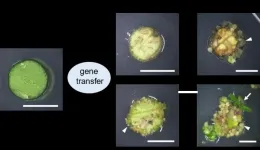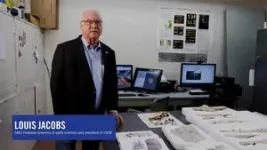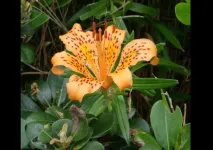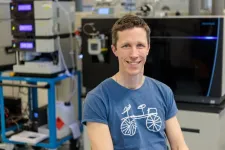(Press-News.org) For ages now, plants have been the primary source of nutrition for animals and mankind. Additionally, plants are used for the extraction of various medicinal and therapeutic compounds. However, their indiscriminate use, along with the rising demand for food, underscores the need for novel plant breeding practices. Advances in plant biotechnology can address the problems associated with food scarcity in the future by enabling the production of genetically modified (GM) plants with higher productivity and resilience to the changing climate.
Naturally, plants can regenerate an entire new plant from a single ‘totipotent’ cell (a cell that can give rise to multiple cell types) through dedifferentiation and redifferentiation into cells with various structures and functions. Artificial regulation of such totipotent cells through plant tissue culture is widely used for plant conservation, breeding, generation of GM species, and scientific research purposes. Conventionally, tissue culture for plant regeneration requires the application of plant growth regulators (PGRs), such as auxins and cytokinins, to control cell differentiation. However, optimum hormone conditions can vary significantly with plant species, culture conditions, and tissue type. Therefore, establishing optimum PGR conditions can be time-consuming and laborious.
To overcome this challenge, Associate Professor Tomoko Igawa, along with Associate Professor Mai F. Minamikawa from Chiba University, Professor Hitoshi Sakakibara from the Graduate School of Bioagricultural Sciences, Nagoya University, and Expert Technician Mikiko Kojima from RIKEN CSRS, have developed a versatile method of plant regeneration by modulating the expression of ‘developmental regulator’ (DR) genes which control plant cell differentiation. Giving further insights into their research work published on 3 April 2024 in Volume 15 of Frontiers in Plant Science, Dr. Igawa says, “Instead of using external PGRs, our system uses the DR genes, which are involved in development and morphogenesis, to control cellular differentiation. The system utilizes transcription factor genes and resembles induced pluripotent cell generation in mammals.”
The researchers ectopically expressed two DR genes, namely — BABY BOOM (BBM) and WUSCHEL (WUS) from Arabidopsis thaliana (used as the model plant), and examined their effects on the differentiation of tobacco, lettuce, and petunia tissue cultures. BBM encodes a transcription factor that regulates embryonic development, while WUS encodes a transcription factor that maintains stem cell identity in the shoot apical meristem region.
Their experiments revealed that the expression of Arabidopsis BBM or WUS alone was insufficient to induce cell differentiation in tobacco leaf tissue. Conversely, co-expression of functionally enhanced BBM and functionally modified WUS induced an accelerated and autonomous differentiation phenotype. The transgenic leaf cells differentiated into calli (a disorganized mass of cells), greenish organ-like structures, and adventitious shoots in the absence of PGR application. Quantitative polymerase chain reaction (qPCR) analysis (a technique used to quantify gene transcripts) revealed that the expression of Arabidopsis BBM and WUS was associated with the formation of transgenic calli and shoots.
Given the key role of phytohormones in cell division and differentiation, the researchers went on to quantify the levels of six phytohormones, namely — auxins, cytokinins, abscisic acid (ABA), gibberellins (GAs), jasmonic acid (JA), salicylic acid (SA), and their metabolites in the transgenic plant cultures. Their findings revealed that the levels of active auxins, cytokinins, ABA, and inactive GAs increased as cells differentiated to form organs, highlighting their role in plant cell differentiation and organogenesis.
Furthermore, the researchers used transcriptome by RNA sequencing (a technique used for qualitative and quantitative analysis of gene expression) to assess the gene expression patterns in the transgenic cells showing active differentiation. Their results suggested that genes related to cell proliferation and auxins were enriched among the differentially upregulated genes. Further validation using qPCR revealed that four genes were upregulated or downregulated in the transgenic cells, including those regulating plant cell differentiation, metabolism, organogenesis, and auxin response.
Overall, these findings shed light on the novel and versatile approach to plant regeneration without the need for externally applying PGR. Moreover, the system used in this study has the potential to advance our understanding of the fundamental processes of plant cell differentiation and improve the biotechnological breeding of useful plant species.
Highlighting the applications of their work, Dr. Igawa remarks, “The reported system can improve plant breeding by providing a tool to induce cellular differentiation of GM plant cells without PGR application. Therefore, in societies where GM plants are accepted as products, it would accelerate plant breeding and reduce associated production costs.”
About Associate Professor Tomoko Igawa
Dr. Tomoko Igawa is an Associate Professor at the Graduate School of Horticulture, Plant Molecular Science Center, and Research Center for Space Agriculture and Horticulture at Chiba University, Japan. Her research interests include plant sexual reproduction and development, as well as plant biotechnology. Her work focuses on understanding the molecular mechanisms underlying the sexual reproduction and differentiation of plant cells using various transgenic systems. She has authored several publications in these domains and is a member of The Japanese Society for Plant Biotechnology, The Botanical Society of Japan, Japanese Society of Breeding, The Japanese Society of Plant Physiologists, and The International Association of Sexual Plant Reproduction Research.
END
Novel genetic plant regeneration approach without the application of phytohormones
Researchers develop a novel plant regeneration approach by modulating the expression of genes that control plant cell differentiation
2024-05-01
ELSE PRESS RELEASES FROM THIS DATE:
ACS inaugural report shows mortality for preventable cancers among native Hawaiian and other Pacific Islanders in U.S. is 2-3 times as high as white people
2024-05-01
ATLANTA, May 1, 2024 — The American Cancer Society (ACS) today released a first-of-its-kind Cancer Facts & Figures for Asian American, Native Hawaiian, & Other Pacific Islander People, 2024-2026. This report shows that despite limited disaggregated data, there is wide variation in the cancer burden among ethnic groups that make up this fast-growing population. Cancer is the second-leading cause of death in the United States nationally but ranks first in Chinese, Filipino, Korean, and Vietnamese individuals, with lung cancer the leading cause of death in men of every Asian American, Native ...
ChatGPT fails at heart risk assessment
2024-05-01
SPOKANE, Wash. – Despite ChatGPT’s reported ability to pass medical exams, new research indicates it would be unwise to rely on it for some health assessments, such as whether a patient with chest pain needs to be hospitalized.
In a study involving thousands of simulated cases of patients with chest pain, ChatGPT provided inconsistent conclusions, returning different heart risk assessment levels for the exact same patient data. The generative AI system also failed to match the traditional ...
Improved AI process could better predict water supplies
2024-05-01
PULLMAN, Wash. -- A new computer model uses a better artificial intelligence process to measure snow and water availability more accurately across vast distances in the West, information that could someday be used to better predict water availability for farmers and others.
Publishing in the Proceedings of the AAAI Conference on Artificial Intelligence, the interdisciplinary group of Washington State University researchers predict water availability from areas in the West where snow amounts aren’t being physically measured.
Comparing ...
A blood test for stroke risk? Study finds network of inflammatory molecules may act as biomarker for risk of future cerebrovascular disease
2024-05-01
A simple blood test could allow doctors to determine whether a person may be at higher risk for stroke or cognitive decline during their lifetime, according to a new UCLA Health study.
The study, published in the journal Stroke, found that measuring concentrations of a network of inflammatory molecules in the blood could allow doctors to calculate a risk score for susceptibility for cerebral small vessel disease – a common cause of stroke and a contributor to cognitive decline found especially among the elderly.
Currently, the only way to determine a person’s risk for cerebral vascular diseases has been ...
New survey finds 75% of Americans feel mental health takes back seat to physical health within U.S. healthcare system
2024-05-01
WASHINGTON, DC – May 1, 2024 – Three-quarters of Americans feel mental health conditions are identified and treated much worse than physical health issues within the U.S. healthcare system, even as more than 80% perceive a dramatic rise in prevalence of mental health issues in the last five years, according to a new survey from West Health and Gallup released at the start of Mental Health Awareness Month and Older Americans Month.
Nearly identical percentages believe mental health is handled either “much” (38%) or “somewhat” worse (37%) than physical health ailments, while 15% say they are dealt with “about the same.” ...
Brief anger may impair blood vessel function
2024-05-01
Research Highlights:
When adults became angry after remembering past experiences, the function of cells lining the blood vessels was negatively impaired, which may restrict blood flow. Previous research has found that this may increase the risk of heart disease and stroke.
In this study, episodes of anxiety and sadness did not trigger the same change in functioning of the blood vessel lining.
Embargoed until 4 a.m. CT/5 a.m. ET Wed., May 1, 2024
DALLAS, May 1, 2024 — A brief episode of anger triggered by remembering past experiences may negatively impact the blood vessels’ ability to relax, which is essential ...
Science advisors unite in a call for greater variety of evidence in developing policy
2024-05-01
What? 5th International Conference on Governmental Science Advice, INGSA2024, marking the 10th Anniversary of the creation of the International Network for Governmental Science Advice (INGSA) & first meeting held in the global south.
Where? Kigali Convention Center, Rwanda: https://www.ingsa2024.com/
When? 1 – 2 May, 2024.
Context: One of the largest independent gatherings of thought- and practice-leaders in governmental science advice, research funding, multi-lateral institutions, academia, science communication and diplomacy is ...
New Japanese lily species identified, 1st addition to sukashiyuri group in 110 years
2024-05-01
A new species of the Japanese lily known as sukashiyuri has been identified for the first time since 1914 by a research team led by Dr. Seita Watanabe, a specially appointed assistant professor at the Botanical Gardens and the Graduate School of Science at Osaka Metropolitan University.
Dr. Watanabe questioned the classification used up to now for sukashiyuri group, which usually has orange flowers. These lilies have high ornamental value, having been exported from Japan for more than two centuries. There have been only four taxonomic groups, but Dr. Watanabe and his team sought evidence to prove that there were ...
The popular kids in school may be sleeping less
2024-05-01
Due to a later melatonin onset and increased alertness in the evening, teenagers often find it hard to fall asleep at a time that would allow them to clock up the recommended eight to 10 hours of sleep each night.
It is also during teenage years when increasing school demands, activities, more independence from parents, and relationships with peers begin to compete with sleep. The role of social context, however, is often overlooked when studying adolescents’ sleep. Now, researchers in Sweden and Australia wanted to find out how popularity ...
Patients with rheumatoid arthritis have unique and complex autoantibody patterns
2024-05-01
Patients with rheumatoid arthritis (RA) all have a unique and diverse set of antibodies that are involved in the development of the disease. Researchers at Utrecht University unveiled the complexity of these antibodies using powerful lab tools capable of analysing our immune system at molecular levels. Their discovery suggests that current assumptions about the origin of RA are too simple. Still, their findings may point towards improved diagnostics.
Rheumatoid arthritis is a chronic autoimmune disease that primarily affects the joints, causing pain, stiffness, and swelling. It arises when the immune system mistakenly attacks the body’s own tissues, leading ...
LAST 30 PRESS RELEASES:
Scientists identify smooth regional trends in fruit fly survival strategies
Antipathy toward snakes? Your parents likely talked you into that at an early age
Sylvester Cancer Tip Sheet for Feb. 2026
Online exposure to medical misinformation concentrated among older adults
Telehealth improves access to genetic services for adult survivors of childhood cancers
Outdated mortality benchmarks risk missing early signs of famine and delay recognizing mass starvation
Newly discovered bacterium converts carbon dioxide into chemicals using electricity
Flipping and reversing mini-proteins could improve disease treatment
Scientists reveal major hidden source of atmospheric nitrogen pollution in fragile lake basin
Biochar emerges as a powerful tool for soil carbon neutrality and climate mitigation
Tiny cell messengers show big promise for safer protein and gene delivery
AMS releases statement regarding the decision to rescind EPA’s 2009 Endangerment Finding
Parents’ alcohol and drug use influences their children’s consumption, research shows
Modular assembly of chiral nitrogen-bridged rings achieved by palladium-catalyzed diastereoselective and enantioselective cascade cyclization reactions
Promoting civic engagement
AMS Science Preview: Hurricane slowdown, school snow days
Deforestation in the Amazon raises the surface temperature by 3 °C during the dry season
Model more accurately maps the impact of frost on corn crops
How did humans develop sharp vision? Lab-grown retinas show likely answer
Sour grapes? Taste, experience of sour foods depends on individual consumer
At AAAS, professor Krystal Tsosie argues the future of science must be Indigenous-led
From the lab to the living room: Decoding Parkinson’s patients movements in the real world
Research advances in porous materials, as highlighted in the 2025 Nobel Prize in Chemistry
Sally C. Morton, executive vice president of ASU Knowledge Enterprise, presents a bold and practical framework for moving research from discovery to real-world impact
Biochemical parameters in patients with diabetic nephropathy versus individuals with diabetes alone, non-diabetic nephropathy, and healthy controls
Muscular strength and mortality in women ages 63 to 99
Adolescent and young adult requests for medication abortion through online telemedicine
Researchers want a better whiff of plant-based proteins
Pioneering a new generation of lithium battery cathode materials
A Pitt-Johnstown professor found syntax in the warbling duets of wild parrots
[Press-News.org] Novel genetic plant regeneration approach without the application of phytohormonesResearchers develop a novel plant regeneration approach by modulating the expression of genes that control plant cell differentiation






